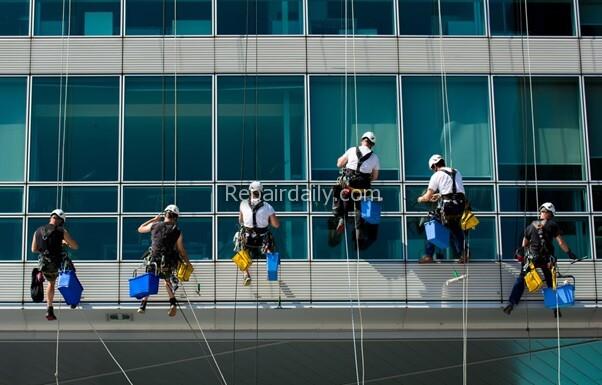

cleaning window glass
It makes sense that high-rise buildings take a hammering. The walls are exposed to wind, rain and pollution. In the short-term, this leads to an unsightly buildup of dirt and grime, but it can harm the integrity of the building in the long-term. Keeping the exterior clean is a matter of appearance and responsible maintenance. It may seem like a cost you don't want to have to budget for, but maintaining the façade, and keeping it clean, can prevent damage becoming a problem that you have to throw a lot of money at to fix.
So, as a building owner or manager, what should you be aware of? Let's take a look at the top three concerns.
1. How often should the building façade be cleaned?
No two buildings are the same, and the impact from the environment around them differs too. There are differing views on the matter also. Some building owners support the advice that building facades should be cleaned once a year and kept on this schedule. Others wait several years. What's agreed is that dirt and grime accelerate the aging of a building and also hide defects.
These are different factors to consider when determining how often, and the level of cleaning effort, needed to clean the façade of a building. For example, the location, and geographic and atmospheric conditions.
Atmospheric pollutants build-up on the surfaces of a building over time. The higher it's content in the air, the quicker it will build-up on the façade of the building. For example, a building alongside a highway will be exposed to more pollutants caused by cars than one in a suburb. However, buildings in a suburban setting are likely to be exposed to higher levels of moisture, which can lead to mildew.
Façade grime caused by mould or algae comes from moisture and may be located on certain parts of the building less exposed to direct sunlight. Different surfaces also pose various cleaning problems. But even glass can get permanently stained if not cleaned when needed, or as frequently as required.
Assessing these factors and your desire for a well-maintained-looking building that boosts 'curb appeal' will help you decide how often the façade of a building should be cleaned.
2. What cleaning methods are used?
There are four categories of façade cleaning techniques. They are chemical, non-chemical, abrasive, or a combination of methods. Non-chemical water pressure cleaning will loosen dirt and wash it away. For an area with heavy stains, this won't be sufficient, and a cleaning agent will be used to remove dirt. Mild detergents may work, but in extreme cases, something like sulfuric acid would be used. Pressure washing, however, is very effective. Because the pressure can be dialed up or down, it can be adjusted to suit the cleaning job on hand. For certain surfaces, like limestone, special chemical cleaners may be used along with lower pressure and high heat.
A professional façade cleaning business will assess the method that needs to be used to clean the outside of a building and quote accordingly. Ask for a thorough explanation of what they propose, and what methods they will undertake to protect the building and ensure there is no damage or deterioration caused by cleaning to materials and finishes.
3. What precautions need to be taken?
Training, taking precautions, and getting permits to go hand-in-hand with the safety of a cleaning project. Low-rise buildings tend to be cleaned using scaffolding provided by NYC Mast Climbers. The building will be roped off, and the staff placed below to direct people away from unsafe zones.
When chemicals are used for cleaning, all the workers are fitted with full face masks or hazmat suits if necessary. If the chemicals are hazardous, the cleaning company will put in place a system to reclaim runoff water that is contaminated. They will ensure the water doesn't run down the drain and contaminate water. Note when it comes to chemical cleaning methods, the company may need to get a permit before they can proceed.
Other issues you may want to discuss with a company before you hire them are:
- Do you send your staff for regular training?
- Do you carry comprehensive insurance?
- Does the state you live in require specific licensing to perform façade cleaning?
- Do they adhere to any ‘green laws’ that are relevant?
- Are there any heritage or landmark boards or other commissions that need to be consulted before you proceed?
The last thing you want is to find yourself in deep trouble because there is an accident on-site, or you fall foul of safety or environment laws and are landed with a fine. Before you sign on, ask for references and ensure the teams are correctly trained and have the necessary equipment.
I'm so excited to tackle all my home improvement projects! From plumbing to DIY and cleaning - I'm ready to get down to work! #homerepair #homecleaning #plumbing #diy #fixerupper #realestate #renovation #interiordesign #farmhouse #diy #homedecor #hgtv #home #farmhousedecor #modernfarmhouse #farmhousestyle #fixerupperstyle #fixandflip #homerenovation #realestateinvesting #beforeandafter #homesweethome #remodel #realestateinvestor #interior #realtor #joannagaines #flippinghouses #countryliving #design #homedesign #farmhouseinspired #investmentproperty #bhghome #renovationproject #farmhousekitchen #homeimprovement #farmhouseliving #cottagestyle #decor #realestateagent #magnoliahome #homeinspo #magnoliamarket #kitchendesign #dreamhome #shiplap #construction #houseflipping #investor #farmhousedesign #architecture #farmhousechic #homereno #rusticdecor #reno #kitchenremodel #webuyhouses #magnoliatable #rentalproperty #fixerupperinspired #newhome #interiors #homeremodel

